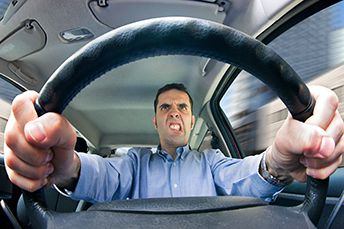+
Road rage is an aggressive or angry behaviour by a driver by way of rude gestures, verbal insults, deliberately driving in an unsafe or threatening manner, or making threats. Today, drivers have become more prone to road rage with displays of aggression becoming a common occurrence.
There seems to be more cars on the road causing congestion; more speed; less patience; more erratic driving. Everyone seems to be in a hurry. Some feel that drivers deliberately set out to make their drive to work impossible.
We see it every day on our roads – people speeding past us, not indicating when they change lanes, doing the zigzag dance in between traffic, tailgating, speeding up to block you out, or flashing their lights from behind you to say ‘get out of my lane’ even if you are doing the speed limit.
What are some of the issues behind Road Rage?
Whether a person leaves work or home in an angry mood (can tend to project that anger out onto other people on the road) or who get angry without too much provocation may engage in quite hostile or aggressive thinking. The result is unnecessary risks being taken on the road (as if to make a point). They feel they have the right to judge how a person drives according to their own highway code.
We may be giving ourselves too many unrealistic deadlines. This means we run the risk of working ‘too hard’, we become tired, stressed and overwhelmed which results in ‘burn-out’. It is also worth mentioning the frame of mind or mood we are in when driving (especially in traffic) – maybe we have just had an argument with someone.
Unfortunately, when a driver is in this frame of mind, there is no conscious awareness of the consequences involved. It is important to learn breathing, relaxation and self-talk approaches to prevent things getting totally out of control.
Unfortunately, there have been cases of road rage which have resulted in the death or significant physical injury of other innocent people. Some of these injuries have resulted in permanent disability. Victims often suffer post traumatic stress which, left unattended can be mentally and emotionally debilitating. When the perpetrator of road rage is sitting in a jail for a long period of time, or paying a hefty fine, was it really worth it? If you had your partner, children or friends in the car at the time, was it really worth it? When you were confronted by the Police, charged and put into a police vehicle, was it really worth it?
For some people, this road rage can stem from a need for control or possession of their ‘lane’. For other people, it can indicate deeper issues around anger and aggression. Drive like a ‘ticking time bomb’ or just pay attention to what you are doing? Your choice.
Some tips to help you enjoy your drive…
- Practice relaxation or calming techniques that you can use without interfering with your driving
- Do not take it too personally – imagine that the other driver has just received some traumatic news and is on their way to the hospital
- Do not look at the other person or use any gestures that could just inflame the situation even further
- Keep a safe distance between you and the other person, or take a detour
- Give yourself sufficient time to get to your destination
- Understand what the actual triggers are that may make you feel really angry
- Learn positive ways to reduce your stress levels
- Practice courteous driving – it can make you feel better to get a smile or thank you hand gesture
Remember…
It is really important to get to the bottom of where this ‘rage’ is coming from. What unmet needs are emerging? What or who are we blaming? What am I not taking responsibility for? What is the current state of my physical and emotional health?
Remember, road rage is never worth it, and it can be very dangerous.
There are much better alternatives to road rage.





